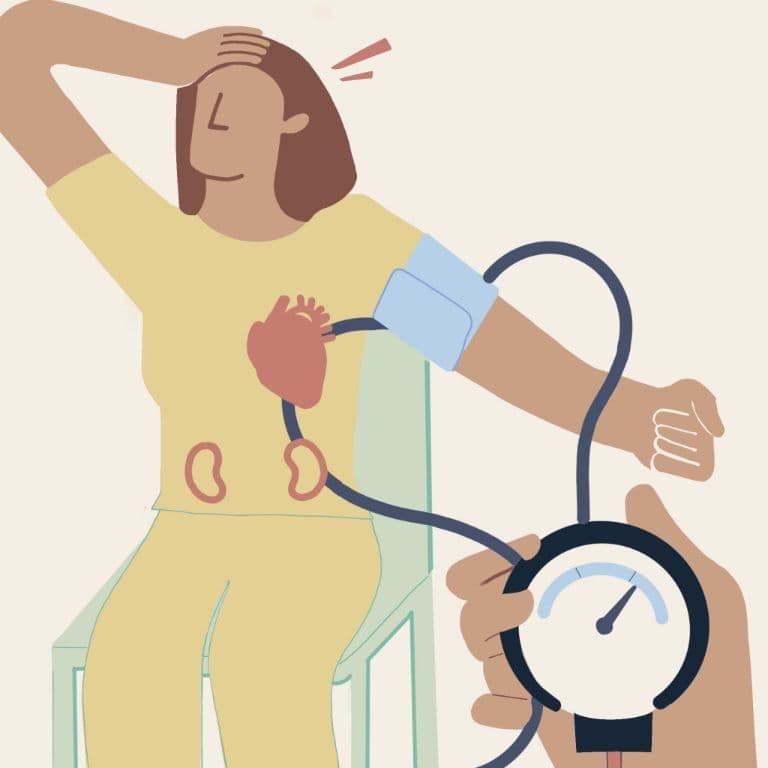It is common knowledge that high blood pressure is dangerous for health and can lead to several health problems. But did you know low blood pressure is an equally important cause of concern? Low blood pressure can prove to be life-threatening if left untreated.
In normal conditions, blood pressure is at its lowest when sleeping and highest when exercising. As blood pressure varies through the day, it is recommended to take several readings to get a true measurement. One single reading may not signify that a person has low or high blood pressure. So, let’s understand the condition of low blood pressure or hypotension, its causes and risk factors and some useful tips to avoid unintentional dropping of the blood pressure.
What is low blood pressure or hypotension?
It’s a medical condition where the upper value of blood pressure also known as systolic value is less than 90 mm Hg and the lower value or diastolic value is less than 60mmHg. However, in healthy adults slightly lower blood pressure might not have any symptoms and may not even require any treatment. What is low blood pressure for one person may be normal for someone else.
In older individuals, conditions of the heart or medications may prevent the blood from being pumped into your vital organs such as the brain, kidneys and extremities. Severely low blood pressure can deprive the body of enough oxygen to carry out its functions, causing damage to the heart and brain.
Blood pressure varies throughout the day, depending on the following parameters.
- Body position: According to recent research, standing up causes a drop in blood pressure whereas it rises on lying or sitting. Also, BP is relatively lower while lying down than sitting position.
- Breathing rhythm: Deep slow breathing decreases heart rate and dilates the blood vessels leading to reduced BP giving a sense of relaxation however during fast and rapid breathing, such as during exercise; in healthy individuals, the body tries to compensate and maintain the BP by increasing the heart rate
- Stress levels: Long-term high-stress load causes a spike in BP whereas sudden onset panic or extreme anxiety may drop the BP levels.
- Physical condition: Athletes generally have a lower baseline blood pressure. That is completely normal.
- Medications you take: Several medications may lower the BP as its primary effect such as in antihypertensives or as side effects, as in antidepressants. This has been discussed later in detail.
- What you eat and drink: High salt content in your food has shown to cause increased BP over time, so low salt food is recommended for lowering it in such cases. Experts suggest a balanced nutritious diet for maintaining the normal physiology and BP of the body. Prolonged fasting and a high intake of alcoholic drinks have also been associated with low BP.
- Time of day: Blood pressure is lower during night or sleeping whereas it continues to rise through the day, usually peaks in the afternoon. By evening it again begins to decrease.
What causes hypotension and the different ways it may occur
In hypotension that is caused by some short-duration event or recurrence of a pre-existing condition, there may be a sudden drop in pressure that may lead to light-headedness, dizziness or blackouts. It can be caused due to the following reasons:
- Loss of blood after heavy bleeding
- Fluctuations in body temperature (very low body temperature or very high body temperature)
- Heart muscle disease causing heart failure
- Sepsis
- Severe dehydration from vomiting, diarrhoea, or fever
- A reaction to a medication or alcohol
- A severe allergic reaction called anaphylaxis that causes an irregular heartbeat
Postural hypotension: As the name suggests, postural hypotension is when someone stands up suddenly after long hours of sitting or lying down. It happens due to the pooling of blood in the limbs. The body compensates by heart beating faster and arteries constrict in the extremities and BP lowers. It can happen due to dehydration, overeating of carbohydrates, ageing, consumption of medications for high blood pressure, experiencing severe emotions or feeling fatigued. It is a common condition in the elderly.
Neurally-mediated hypotension: This may happen due to long hours of standing and may lead to passing out. It’s common in kids and young adults.
Vasovagal Syncope: The word syncope refers to fainting or passing out. It may be caused by certain triggers that evoke the fear response in the body. This condition causes the heart to slow down for a short time. As a result, the brain may not get enough oxygen-rich blood causing one to pass out.
Shock: Extreme hypotension may be caused due to an allergic reaction, anaphylaxis reaction, acute infections and sepsis. It is a life-threatening condition and may require immediate treatment.
Who is at risk for hypotension?
- People of all age groups can be affected by hypotension. However, people who fall in certain age groups such as the elderly are prone to certain types of hypotension such as caused due to posture or medicines.
- Risk factors for hypotension may include the following:
1. being immobile due to long periods of lying down, sitting or standing in one position; may lead to pooling of blood in your limbs and thus less blood in the circulation. Getting up suddenly after that may cause reduced blood flow to the vital organs like the heart and blood, therefore causing low BP.
2. exposed to heat and high temperatures,
3 .pregnancy: Hypotension during pregnancy is normal and usually fades away after birth.
What causes low blood pressure?
Physiological cause: Dehydration or electrolyte imbalance such as diarrhoea, excessive bleeding during periods. It may be caused due to age-related factors and family history.
Underlying conditions: Certain underlying conditions can also cause Central Nervous System (CNS) disorders such as Shy-Drager syndrome and nerve problems such as peripheral neuropathy, cardiovascular disorders, alcoholism, and nutritional diseases.
Medications: Drugs to treat high blood pressure such as diuretics, beta-blockers, calcium-channel blockers, and angiotensin-converting enzyme (ACE) inhibitors. Drugs that have hypotension as a side effect, nitrates, erectile dysfunction medications, drugs for Parkinson's disease, antipsychotics, neuroleptics, anti-anxiety agents, sedative-hypnotics, and tricyclic antidepressants.
How is Hypotension diagnosed?
Hypotension is diagnosed based on your medical history, physical examination, and test results.
Symptoms for hypotension
It usually presents as:
- Lightheadedness,
- Nausea,
- Unusual thirst,
- Weakness or tiredness
- Blurred vision,
- Cold pale skin,
- Lack of concentration, and
- Sometimes fainting.
Usually, one odd event of postural hypotension, dizziness or blackout, may not be cause for concern. However, if it is recurring or a long term condition, it would be advisable to consult your doctor immediately, as it may be associated with an underlying pathology or condition.
Precautions to avoid low BP conditions
Consuming certain types of food and altering some habits can help keep the low blood pressure condition at bay:
- Take more fluids to prevent dehydration
- Consume Vitamin B-12 and folate-rich foods such as eggs, nutritional yeast, fortified cereals, leafy vegetables, citrus fruits, beans, lentils
- Salty food intake in case your blood pressure (BP) always remains low
- Avoid alcoholic beverages in large quantities
- Eat in small portions and frequently throughout the day
- Change your posture with slow movements and not sudden jerky movements.
- Avoid lying or sitting in one position for long hours; keep moving in your place or change posture every 10-15 min.
- Coffee and caffeinated drinks are a good instant remedy for low BP
- Use compression stockings
- Discuss medicines and their side-effects with your doctor
Health checklist when taking blood pressure medication
- Know your medicines and their side-effects
- Each doctor you visit must know which all medicines you’re taking
- Follow a schedule for taking medicines and adhere to it
- Avoid self-prescribed over-the-counter drugs or herbal drugs or any other types of drugs
- Do not increase or decrease your dosage without a doctor's prescription
- If you miss a dose, take it as soon as possible. If it's almost time for the next dose, do not take a double dosage to cover for the missed dose
Disclaimer- This information is provided for educational purposes and should not be construed as medical advice. Please consult with your healthcare practitioners before undertaking any changes in your diet or adding supplements.
Proactive For Her is a digital clinic for women, offering accessible, personalized, and confidential health-care solutions. We offer products and services for out-patient health concerns of Indian women, across their lifetime - from puberty to pregnancy to menopause. To know more on the sexual and reproductive health of women, visit https://www.proactiveforher.com.

